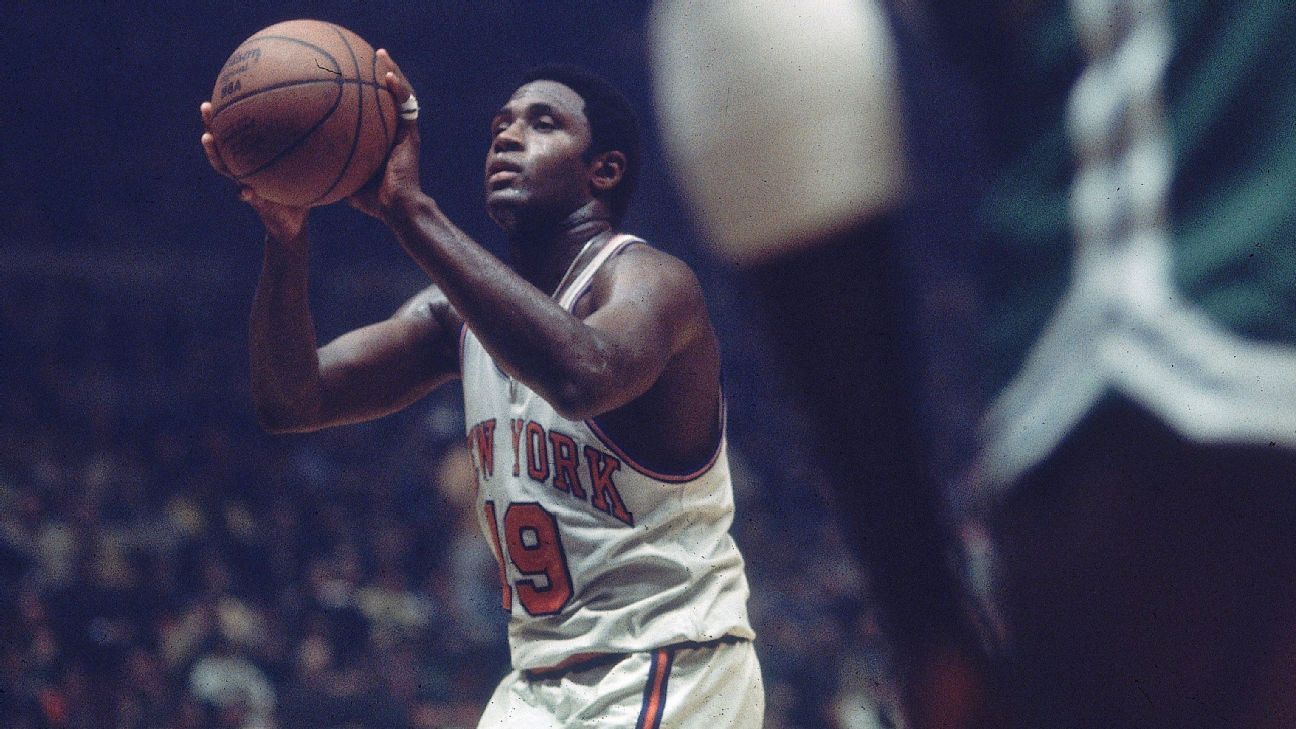Willis Reed, the legendary captain and star center for the New York Knicks who led the franchise to its only two championships and was the author of one of the signature moments in NBA history, has died. He was 80.
“The Knicks organization is deeply saddened to announce the passing of our beloved Captain, Willis Reed,” the Knicks said in a statement issued Tuesday afternoon. “As we mourn, we will always strive to uphold the standards he left behind — the unmatched leadership, sacrifice and work ethic that personified him as a champion among champions.
“His is a legacy that will live forever. We ask everyone to please respect the family’s privacy during this difficult time.”
Reed, a burly, physical presence in the post across his 10 years in the NBA — all with the Knicks — was the NBA’s Rookie of the Year in 1965 and its Most Valuable Player in 1970, as well as a seven-time All-Star and a five-time All-NBA selection. He was also eventually named to the NBA’s 50th and 75th anniversary teams.
But his place in history was forever etched on May 8, 1970.
New York was set to face Wilt Chamberlain and the Los Angeles Lakers in Game 7 of the NBA Finals that day at Madison Square Garden in the hopes of winning the franchise’s first-ever championship. Reed — who had missed Game 6 with a severe thigh injury — wasn’t expected to play.
But Reed stunned the sellout crowd at the World’s Most Famous Arena by walking out of the tunnel to the iconic call of “Here comes Willis” by radio broadcaster Marv Albert.
Reed then scored the first two baskets of the game — the only two he would score across 27 minutes of action. But the emotional lift he gave the Knicks — coupled with fellow Hall of Famer Walt “Clyde” Frazier scoring 36 points and dishing out 19 assists in the greatest game of his career — delivered New York its first NBA title in what became known to history as “The Willis Reed Game.”
“Willis Reed was the ultimate team player and consummate leader. My earliest and fondest memories of NBA basketball are of watching Willis, who embodied the winning spirit that defined the New York Knicks’ championship teams in the early 1970s,” NBA commissioner Adam Silver said in a statement. “He played the game with remarkable passion and determination, and his inspiring comeback in Game 7 of the 1970 NBA Finals remains one of the most iconic moments in all of sports.”
Reed was named Finals MVP for that series, and then, after the Knicks lost to the Lakers in five games in 1972, led New York to a second title. He won a second Finals MVP award as the Knicks got revenge on the Lakers in five games in 1973.
Reed would retire after the 1973-74 season having spent his entire 10-year NBA career in New York, and would forever be known simply as The Captain for his leadership and commitment to teamwork.
Harvey Araton, the author of “When the Garden was Eden,” a book on those 1970s Knicks, said those values were summed up to him when, as part of the reporting for the book, he left Reed a copy of a video of Game 5 of the 1970 finals — one that Reed had told Araton, prior to watching it with him, he’d never seen before.
“A few weeks later, an envelope shows up at my house with a note attached to the video that Willis said, ‘Thanks for the video. Our greatest victory.’
“That’s a hell of a thing, for a guy who was the MVP of two NBA Finals and was a Hall of Famer player, to say that the team’s greatest victory was one achieved without him. That kind of summed up who he was. He was totally about team. That manifested itself in so many ways. Just those three words — ‘our greatest victory’ — left an impression on me.”
Reed’s No. 19 became the first retired by the Knicks in 1976, and he was elected to the Naismith Memorial Hall of Fame in 1982. He went on to be the head coach of the Knicks for a little more than a year, and later spent four years as the head coach at the University of Creighton, before working for more than a decade in the then-New Jersey Nets’ front office, first as general manager and then as senior vice president of basketball operations.
“What I remember about Willis is he would always carry a blue Sharpie with him wherever he went, and he’d always have a stack of pictures with him from when he played for the Knicks,” said ESPN’s Bobby Marks, who spent several years working for Reed when he was an executive with the Nets. “And he’d go out of his way, whether it was those pictures or a basketball, he would never turn anyone down. It’s a lasting remembrance I always think about, giving back to people who are less fortunate.”
Reed also worked as an assistant coach for the Atlanta Hawks from 1985 to ’87, when current 76ers coach Doc Rivers played point guard for the team.
“I loved this man… He was my assistant coach when I was a player with the Hawks,” Rivers said in a tweet. “He was simply a great person, A man !!! A leader!!! A Winner!!!”
Reed was born on June 25, 1942 in Dubach, Louisiana. After playing high school ball in Lillie, Louisiana, he starred at Grambling State University from 1960 to ’64, averaging over 26 points and 21 rebounds as a senior, before New York selected him in the second round of the 1964 NBA draft.
He would go on to finish his career with averages of 18.7 points and 12.9 rebounds per game.
